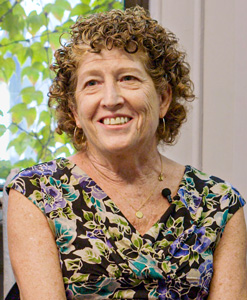Armand is a 78-year-old gay man who has lived with chronic pain for over ten years. A retired actor who enjoyed a successful career on stage and as a mentor for young actors, he now has multiple health conditions including arthritis, a history of cancer, and complications from spinal surgery. He is able to ambulate only with assistance and he rarely leaves his home. He was referred to the SPOP clinic two years ago with symptoms of major depressive disorder and generalized anxiety disorder, and at intake he indicated that he felt isolated, fearful, depressed, and worried about his finances.

Nancy Harvey, LMSW
SPOP (Service Program for Older People) is the only agency in New York City that is entirely focused on providing community-based behavioral and mental healthcare to adults age 55 and older. Our primary program is a behavioral health clinic that provides treatment at our office and 20 satellite locations in the city, via telehealth, and in the home for clients who are deemed homebound due to physical or psychiatric disability. We work with hospitals, older adult centers, and other aging services providers to reach out to adults who otherwise have challenges accessing to behavioral health care, including those who are marginalized as a result of poverty, disability, race, ethnicity, sexual orientation, gender expression, or other factors.
Armand’s case stands out as an example of an individual who was already at risk for physical or mental health disparities – he is financially disadvantaged, gay, isolated, medically frail, and lacking familial supports. His overall fragility was further exacerbated by chronic pain and an inherent mistrust of the healthcare system after decades of feeling the need to hide his sexual orientation from providers.
Recognizing the complexity of his profile, we paired him with an especially empathic clinical social worker with expertise in chronic illness and lived experience as an LGBTQA+ person. He met with her using telehealth, quickly established a therapeutic rapport, and worked toward treatment goals to manage his depression and anxiety. He also enrolled in a therapy group at SPOP for older adults with chronic illness and pain, where he was able to share compassionate support with others who were also living with pain. The increased social contact boosted his mood, and the group enhanced the work that he was doing with his individual therapist.
One of Armand’s greatest challenges was the fact that he was entirely alone, with no family, partner, or advocate – a situation that is all too common among older adults in the LGBTQA+ community. His therapist reached out to the Friendly Visiting Program at SAGE, the national center for advocacy and support for older LGBTQA+ adults, and they connected him to a volunteer visitor who has now been with him for 18 months. She has become a good friend and a reliable source of companionship and conversation, and her visit is a high point of Armand’s week.
Armand’s therapist also connected him to other community resources including home-delivered meals, legal services for advance care planning, and an affordable assisted living facility where he has applied for housing. He is currently engaged in a form of life review therapy where he reflects on the highlights of his life and career, and he often breaks into song during his sessions. While he continues to live with serious medical challenges and pain, he has a far more positive life view and feels less alone on his life journey.
SPOP serves adults age 55 and older and about 75% of our client population is over age 71. Hospitals and medical providers are among our leading sources of referrals, and at least two-thirds of our clients are managing a serious medical condition or chronic pain.
Pain and mental illness share the same system circuitry in the body – the central nervous system – and they impact one another both neurologically and emotionally. We know that pain exacerbates the risk of suicidality in older adults and we have learned that somatic therapy, which focuses on the body, can reduce the impact of pain. All of our clinicians are trained in the use of somatic techniques, such as breathing, visualization, and relaxation exercises, which help to release muscle tension and address physical discomfort and pain while also reducing symptoms of anxiety, depression, and post-traumatic stress.
Physical pain is highly subjective, and we often see clients who feel desperate for validation and acknowledgement of their pain. We use therapy groups to address this challenge, as participants acknowledge the feelings of one another in a supportive setting. We also connect clients to other community supports, such as friendly visiting and home-delivered meals, to address social isolation and concrete needs. And we prescribe medications for mental health needs that can sometimes also improve pain.
Armand is just one of hundreds of clients we will see this year who suffer from chronic pain. He is older and frailer than when he first came to SPOP, but he now feels he is in control of his life. He has learned techniques to manage his pain and mental health symptoms, is less isolated, and has a plan in place if he is no longer able to live in his apartment. He has found deeper meaning in his life’s work, as he recalls his days on the stage during therapy sessions, and he treasures his relationship with his Christy, his friendly visitor. Physical pain is still part of his life, but it no longer defines him.
Visit www.spop.org to learn more about SPOP and its role as a community-based behavioral healthcare provider for older adults in New York City.








